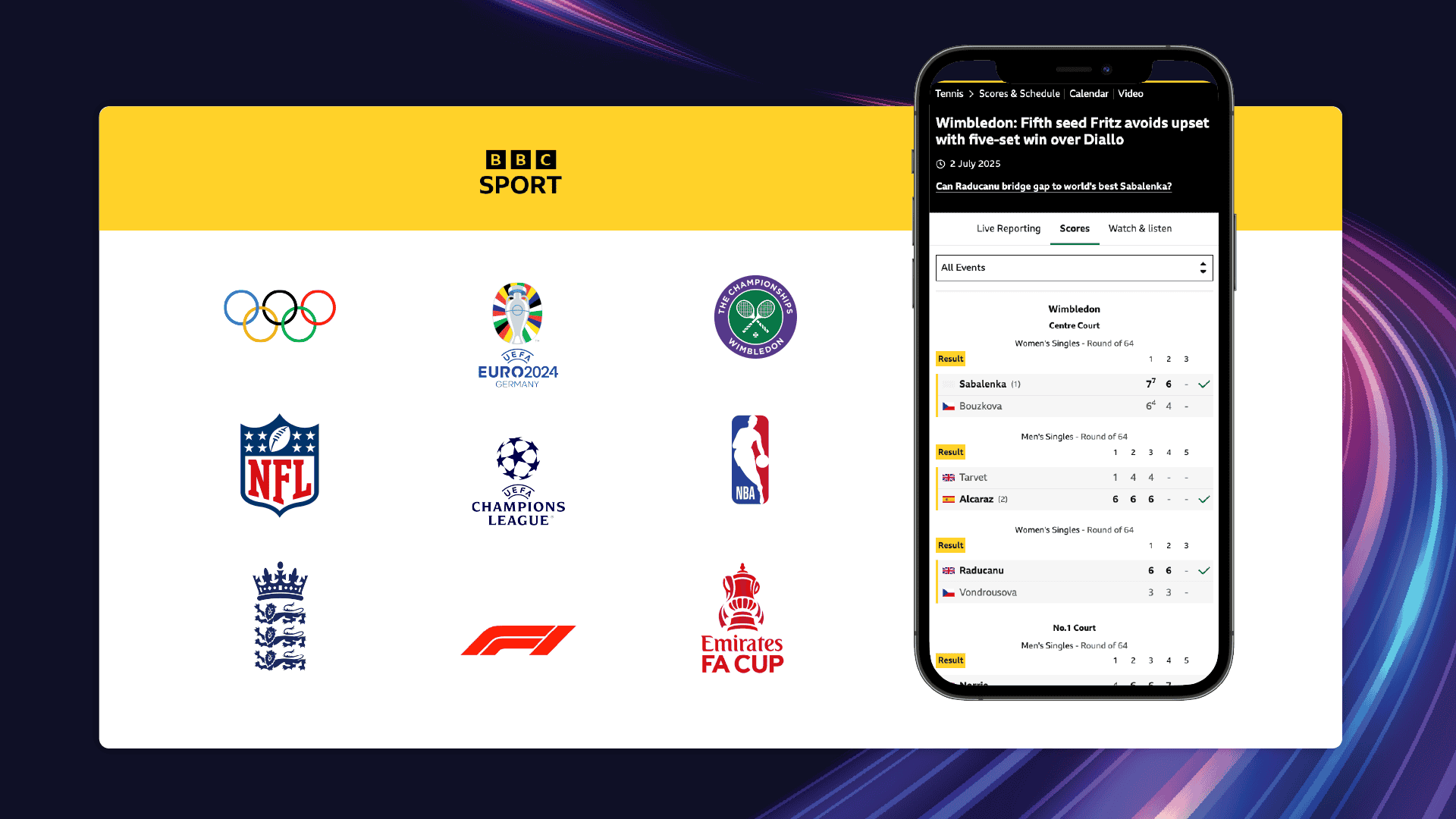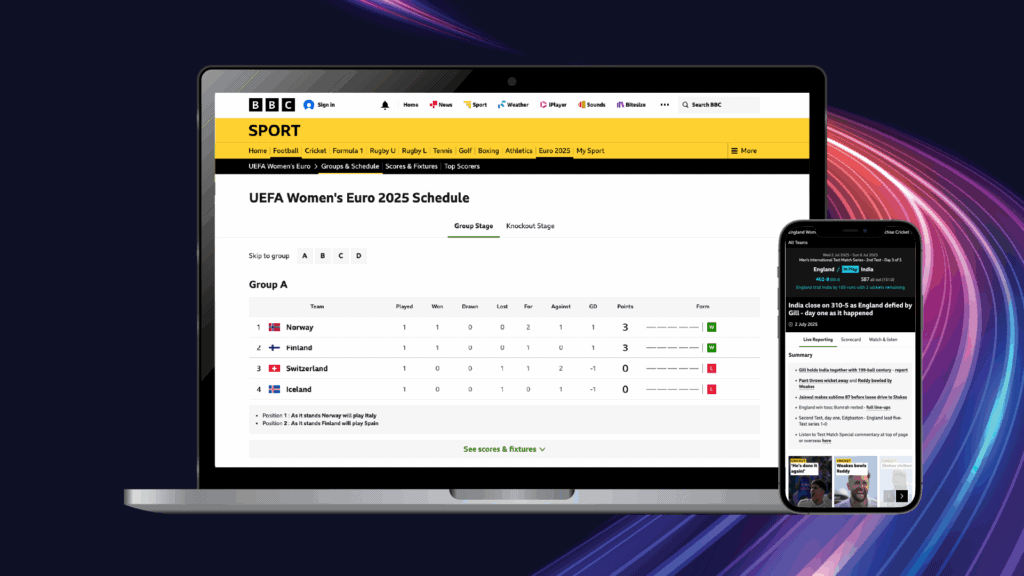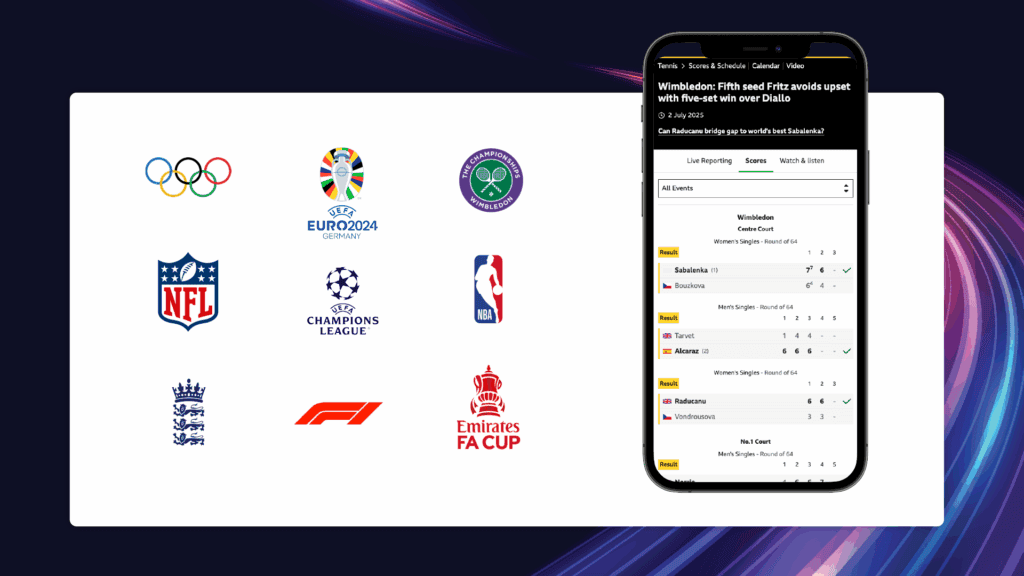
From the Champions League to the Super Bowl: Evolving BBC Sport through digital transformation
The challenge
There are few things that bring people together like sport. Live events dominate UK broadcast figures each year; tens of thousands of fans pack into stadiums every weekend; and social media is flooded with reactions, opinions and emotions with every kick of a ball or swing of a bat.
The BBC play a crucial role in this cultural phenomenon to “inform, educate and entertain”, with the BBC Sport website receiving billions of visits each year as the go-to website for millions of people. Half of the UK’s population visit the BBC website every week, with tens of millions more around the world.
Against the backdrop of a looming technical migration deadline, Softwire were trusted with the BBC Sport brand – refreshing everything from the backend data ingest and storage architecture, to the frontend presentation of high volumes of fast-flowing data across myriad devices and broad accessibility needs.
As a licence-fee-funded public service, both quality and value for money are essential. We had to provide both of these, also working at high velocity to guarantee delivery against a challenging timeline before the legacy services were decommissioned.
Our solution
Vast quantities of sports data, instantly available
When someone is following a finely balanced cricket match on the train or keeping up with the weekend’s football scores at a birthday party, they expect live match information to be available immediately, keeping them informed in real time.
Working with BBC architects, we developed a “Sport Catalogue” for cricket and horse racing, which receives frequent updates pushed from third-party data providers. The data is ingested, processed and stored in a database, then surfaced to the audience via a serverless API with safeguards to ensure that sports fans are always seeing the latest data.
This pattern scales across multiple sports, allowing a common approach regardless of the data source. By allowing direct access to sports data in a BBC-owned database, our solution enables a higher degree of control, performance optimisation and access to historic data than the legacy approach.
Iconic experiences, accessible to all
The BBC launched “WebCore” – a new standard way for creating the BBC website – in 2020, built upon the foundational principles of reuse, consistency, theming and clean API design. As well as rebuilding the BBC Sport pages, we ensured that we went beyond our concrete scope to assimilate with, and contribute to, the WebCore community.
When we needed a table for football top scorers, for example, we built a generic component that was immediately usable for all tables on the BBC website. If BBC News want to display tables of general election results or BBC Weather want to create an array of thunderstorm warnings, these teams can now use a component that adapts to their theming and has already solved the complex accessibility and responsiveness challenges associated with tabular data. Users benefit from this too, enjoying a familiar, consistent and accessible experience across the entire BBC.
Our approach – used from small components to entire pages – resulted in complete trust from the BBC and our regular involvement in the technical advisory group for the WebCore framework itself.

Saving editorial time with automated page creation
New sports events arrive in a fast and constant stream, and the BBC Sport’s editorial floor is typically a hive of activity as journalists work to keep up. To provide “one-page-per-match” (OPPM) coverage – for example, for the FA Cup final – editorial staff would have to manually configure pages for each event, a repetitive and laborious task.
We developed a new, automated service that receives data-driven notifications of new football matches and automatically creates a new page for each. This immediately surfaces a new OPPM to users, leaving editorial staff to focus on creating brilliant content.
To protect the BBC’s reputation for editorial excellence we built in bespoke checks and controls – to prevent creating duplicate pages, for example – and the result was a win-win: improved OPPM coverage for less manual effort.
The Result
We delivered each of these complex workstreams on time to keep the BBC’s digital transformation programme on track, reaching millions of users billions of times per year.

By functioning as a complete digital transformation partner, rather than just a “lift-and-shift” development team, we exceeded expectations for quality, seamlessly introduced several product improvements, and positioned the BBC with a robust technical foundation to iterate on in future.
Sport data – live and historic – is surfaced to users in seconds. Our approach to automation has freed up editorial staff to focus on what they do best. We have fostered a culture of shorter release cycles than ever before. We redefined the approach for developing sport experiences to minimise duplication, maximise reuse, and ensure that future features can be implemented once and then applied everywhere – even outside sport!
Most importantly, we’ve built high-trust relationships and have enjoyed working as a partner with the BBC. Impressed by our quality and “above-and-beyond” approach, the BBC have engaged us for further work across News and Sport, including the web migration for the remaining 15 sports, highly interactive “Player Rater” and “Team Selector” components to augment articles, and detailed business news charts to keep track of financial markets.
So next time we see a swathe of yellow-topped phone screens in front of us at Twickenham or spot our colleagues not-so-sneakily keeping track of The Ashes, we can know that this experience at scale has been enabled by our partnership with the BBC. We’ve laid a strong foundation; it’s exciting to consider what’s next!




